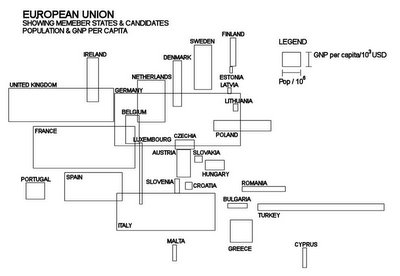
The European Union should be interesting to those of us who live in the U.S. for several reasons. As competitors in the world market, what they do matters to our economy. They are our oldest allies. Their work on reaching consensus can be a model for us, as we try to get along with each other and respect difference. And what folks over there think about the United States can help us reflect on our own decisions. The following news digest touches on several of these points.
This news is about the agendas of the Austria and Finland (pdf) leaders who will hold the presidencies in 2006. They will be focusing on finances and budgeting, including enlarging the Euro area, and developing a genuine internal market. Work will continue on their constitutional treaty, more economic growth, more jobs, and strengthening international competitiveness.
In the United States, there seems to have been a concerted effort on the part of the current administration to cut out the influence of the intelligencia, a disregard for the opinion of outside experts. The EU has its own problems with this idea. Regarding the EU Constitution, EU Rota carried this story about what The Austrian Chancellor considers as "the masses," who might generally be considered "elites." To quote,
This article in the IHT is entertaining if read in the serious vein of the comments offered. With plans to revive that EU constitutional process, the new President of the Council, Austrian Chancellor Wolfgang Schussel, is looking to include the 'masses' in the process this time around: Schussel called that process elitist and anachronistic, declaring, "I want to avoid a top-down approach." This time, he said, a broad spectrum of citizens including scientists, journalists and professors should contribute ideas for a new constitution.
Unemployment rates in the United States seem to be improving. But the EU has a longstanding problem with higher unemployment rates. According to Europa (title linked above), November 2005 Euro-zone unemployment is unchanged at 8.3%. Here are the details,
To elaborate on one of these country's employment situation, here is an earlier BBC story about German jobs. To quote:Euro-zone1 seasonally-adjusted unemployment2 stood at 8.3% in November 2005, the same as in October. It was 8.8% in November 2004. The EU253 unemployment rate was 8.5% in November 2005, unchanged compared to October. It was 9.0% in November 2004.
In November 2005, the lowest rates were registered in Ireland (4.3%), Denmark (4.5%), the Netherlands (4.7%), the United Kingdom (4.8% in September) and Austria (5.2%). Unemployment rates were highest in Poland (17.4%), Slovakia (16.0%), Greece (10.1% in third quarter 2005), Germany4 (9.3%), France (9.2%) and Latvia (8.6%).
German unemployment remains stubbornly high. Germany saw an unexpected sharp fall in the number of people out of work in December. When adjusted for
seasonal variations, the number of jobless people fell 110,000 to 4.64 million people.
The unadjusted figure, influenced by seasonal layoffs in the construction industry, still showed a slight rise. But at 11.2%, the adjusted unemployment rate is the lowest in a year, and reinforces hopes that Europe's largest economy could finally be
recovering.
Except for the current administration's insistence of maintaining a tight hold on information we are not terribly plagued by rampant censorship. But my fear is that all the signs are there that this could change. And, at the very least, Europeans are noticing the administration's general insistence on unprecedented executive powers. This is a EU Rota story about Freedom of speech in Belgium, from which comes this quote,
"I'm concerned that the image of America as a haven of state legality where the state protects the personal freedom of individuals has suffered," said Karsten Voigt, the German Foreign Ministry's co-ordinator for German-American cooperation, who will be traveling in Merkel's delegation during her visit on Jan. 13. "I hope people in the US are aware of the problem."Let us all hope Mr. Voigt makes a stop in Belgium on his way to the US. There he may find the following: Yesterday a Belgian court in the Walloon town of Charleroi condemned Jean-Pierre Walenne, a 60-year old local politician of the Front Nouveau Belge (FNB). Walenne has to pay a fine of 1,500 euro and has lost his civil rights (the right to work as a civil servant, to vote and to stand for election) for a five-year period.
In some ways EU partners can be ahead of the United States on the issue of the environment, for example. This BBC story concerns Sweden's traffic fees:
Stockholm test-runs traffic fees: Drivers pay each time they enter or exit the city under the schemeCongestion charging to cut traffic and pollution has come into effect in the Swedish capital, Stockholm. For a seven-month trial period, drivers entering or exiting the city during the daytime will be charged between 10 ($1.30) and 20 kronor each time. A recent opinion poll suggested two out of three Stockholmers oppose the charge, but campaigners say the growing weight of traffic makes it inevitable. Stockholm follows London, Oslo and Singapore in introducing the tax.
This CNN story is a few days old, but still pertinent, because the situation was so "dicey." It seems that cooler heads prevailed. The headline reads, "Russia-Ukraine reach a deal" on natural gas. To quote,
Moscow and Kiev officials have praised a deal to end a pricing dispute for Russian natural gas that caused shortages in Ukraine and throughout Western Europe.
"Two nations won, Russia and Ukraine; Europe won; it is common sense that won," Ukrainian Prime Minister Yuriy Yekhanurov told reporters Wednesday after an early morning agreement was reached between energy officials from both countries.
Ukrainian President Viktor Yushchenko also hailed the deal, saying the "Ukrainian economy is mostly ready for new market conditions," The Associated Press quoted his office as saying. His Russian counterpart Vladimir Putin said the agreement would secure stable long-term export supplies for Europe.
No comments:
Post a Comment